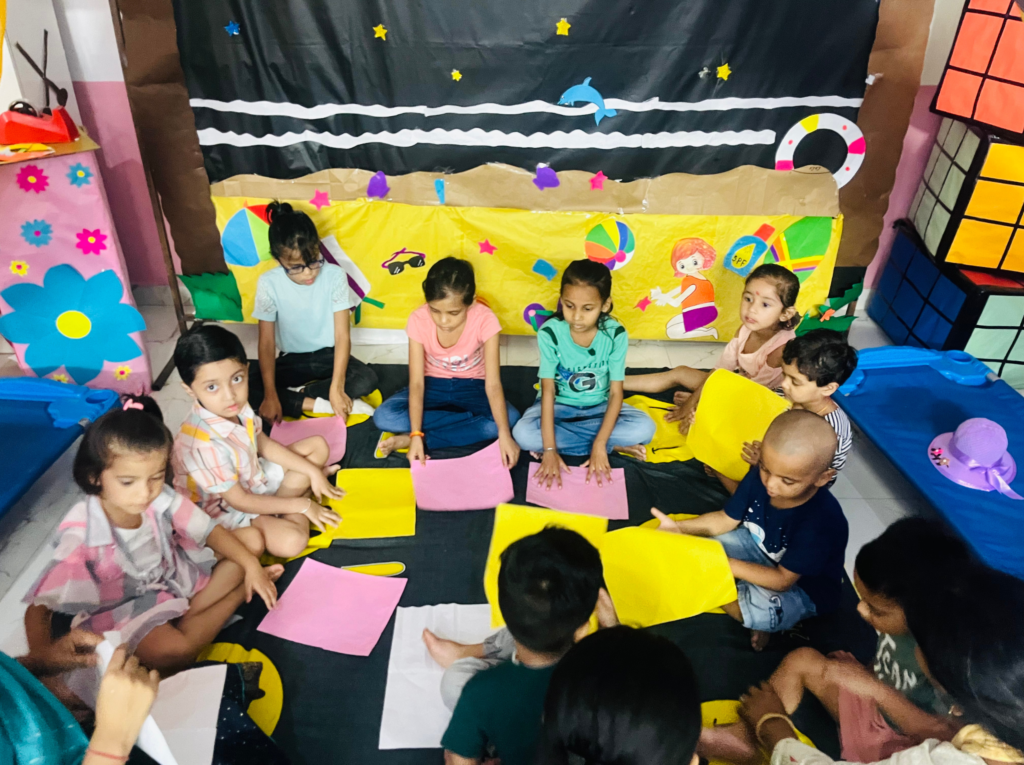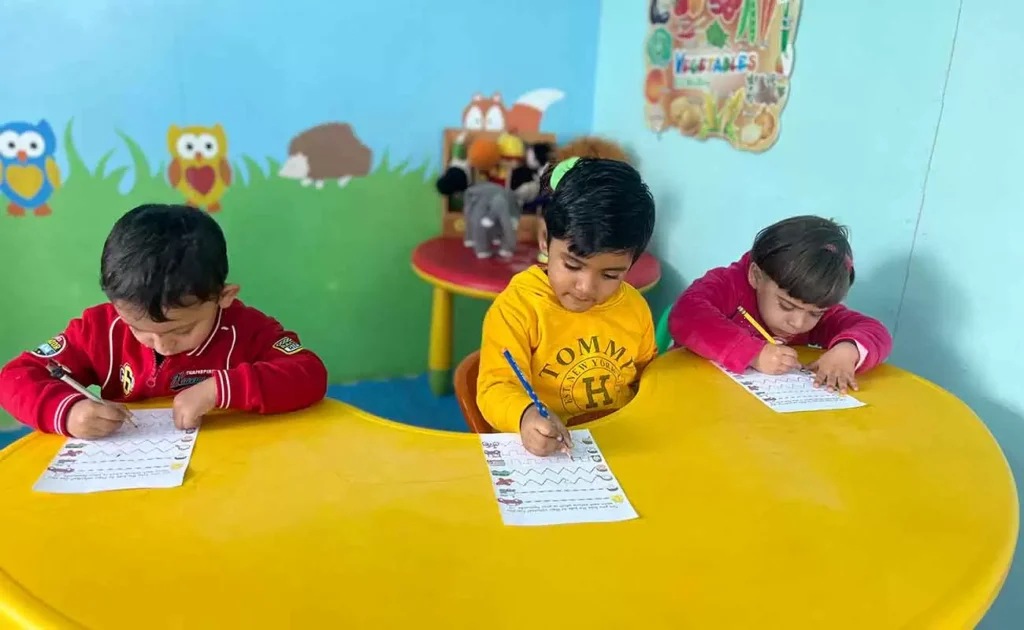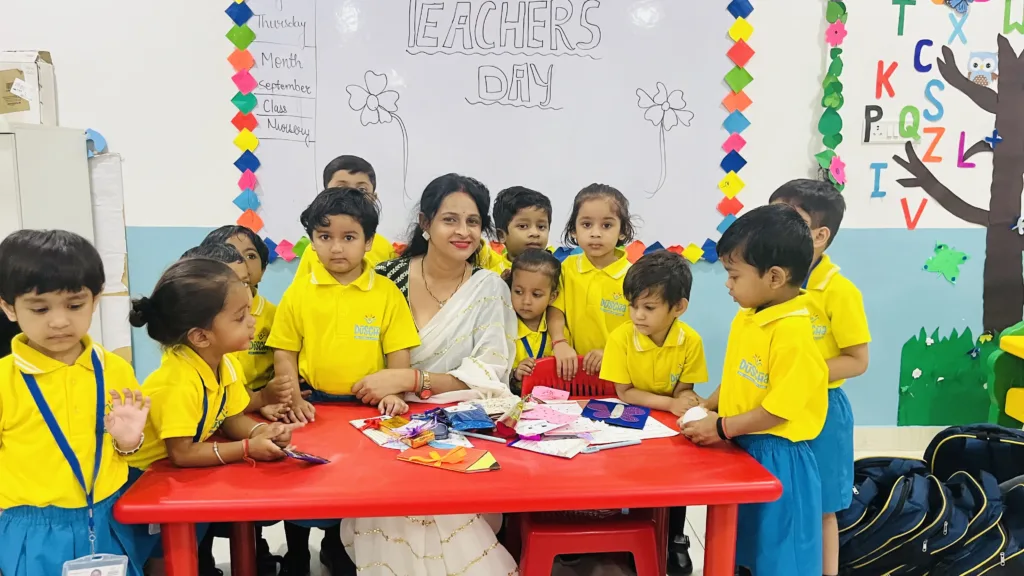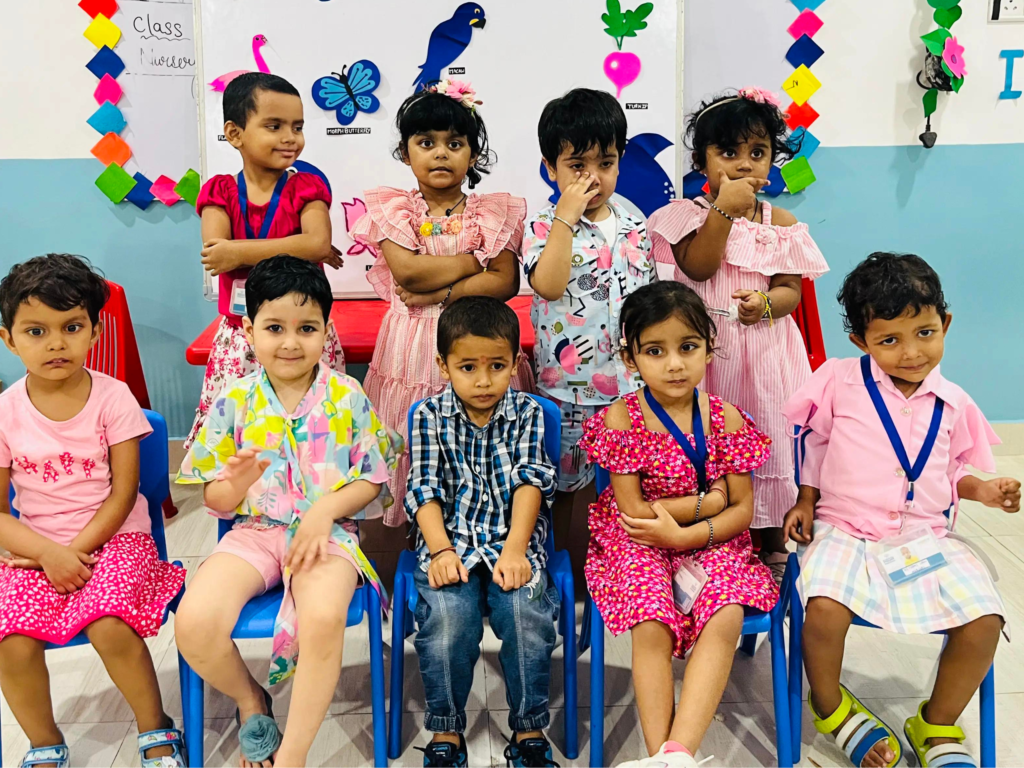Introduction
Welcome to Duscha Preschool, the best preschool and daycare in Lucknow! Today, we’re excited to share some valuable insights on how to develop pre-reading skills in kids. This early literacy foundation is crucial for children’s academic success and lifelong learning. We’ll explore 10 helpful methods that parents and educators can use to foster these skills effectively.
What are Pre-Reading Skills for Kids?
Pre-reading skills are the foundation for learning to read. These skills are crucial for preschoolers and continue to benefit them as they grow. Understanding and reading words help children succeed in school and future jobs. Parents should give their children chances to practice these skills early on.
Oral Language
Social Development plays a crucial role in child development and it has a positive impact on the overall development of the child. Duscha Daycare provides a great opportunity for children to interact with others, make friends, and learn how to share and communicate effectively. Daycare is the best place where children can develop their social skills.
One of the significant benefits of enrolling a child in the best daycare in Lucknow is the opportunity for social interaction.
Phonological Awareness
Phonological awareness is a listening skill necessary for learning to read. Identifying and playing with word parts is essential for future success with phonics. This skill typically starts developing around the age of 3 or 4, as children begin to play with words by changing sounds or syllables.

Beginning Writing

Beginning writing skills include fine motor abilities and eye-hand coordination for controlling writing tools. Children learn that they can express their thoughts through drawing and writing, and they begin to write letters that represent sounds in words.
Print Awareness
Print awareness is the understanding that letters form words and these words have meaning when read. This includes knowing that the letters on a stop sign have a message and understanding that words in a book tell a story or provide information. Children also learn the order of reading, such as reading from left to right and cover to cover.
What are Pre-Reading Activities for Kids?
While many children will develop some pre-reading skills independently, most benefit from direct instruction. Here are ten pre-reading activities for preschoolers that are fun for home or school.
Here is a Top 10 Pre-Reading Skills in Kids
Recreate a Picture Book
While many children will develop some pre-reading skills independently, most benefit from direct instruction. Here are ten pre-reading activities for preschoolers that are fun for home or school.
Read to Your Child
Reading to your child every day is the best way to introduce them to cadence, words, sequencing, and fluency. Choose an old favorite of yours or a book your child likes and read it to them at bedtime or any other time you have together. Make this a habit,
Create Stories About Pictures
Ask your child to tell you stories about random pictures, such as family photos or images from magazines. Encourage them to describe the characters and their actions. Let them know that there are no right answers and to use their imagination. You can also create your own stories to encourage them further.
Use Story Prompts
Give your child a picture or a scene and ask them to tell a story about it. This builds narrative skills and imagination, which are important for understanding and composing stories later.
Play Sequencing Games
Use sequencing cards, which can be purchased in stores, to help your child understand the order of events in a story. Each card has a picture that your child needs to place in the correct order. After sequencing the cards, ask your child to tell the story. This activity helps them learn that stories have a beginning, middle, and end.
Label Common Items at Home
Label items around your home with pieces of poster board. Create two sets of labels: one set to place on the items and the other for your child to play with. Allow your child to match the two sets without pressure, helping them recognize words and their corresponding items.
Play Word Games
Word games let your child experiment with letters, words, and sounds, all of which are essential for learning to read. Play games like I Spy, Word Families, and Rhymes with your preschooler to make learning fun.
Use Flashcards
Flashcards are an effective method for teaching your child to recognize and name letters. This simple activity helps establish the sound-symbol connection, which is crucial for early reading. Choose materials that match your child’s ability level to keep them engaged and challenged.
Puzzle Words
Use puzzles that feature whole words or syllables to be pieced together. This hands-on activity strengthens understanding of how letters form words.
Letter-Sound Bingo
Create bingo cards with letters instead of numbers and play sounds that correspond to the letters. This game reinforces the association between letters and their sounds, a key aspect of phonics.
Conclusion
Introducing these activities will help develop reading skills in children. Many phonological awareness games and print motivation activities are available, and involving children in selecting materials and making up game rules will make the experience enjoyable.
If you are searching for a good preschool for your child, consider Duscha Preschool in Lucknow, known for providing the best guidance to its students. To learn more about our curriculum, contact us or fill up the form our team will connect you!
Give your child a picture or a scene and ask them to tell a story about it. This builds narrative skills and imagination, which are important for understanding and composing stories later.
From the above points, we know that selecting the best daycare in Lucknow is very important for both parents and children. Daycare helps the children to grow confidently and independently by doing the tasks on their own. It is a safe place for kids to play, explore, make friends, and be creative. They get ready on time for school by following rules and regulations.
It’s a fun environment for children where they can be creative and curious. In general, daycare positively shapes kids, preparing them for overall development, school, and life.
Here are just a few of the programs we offer at Duscha PreSchool & Day Care:
- No Tuition Fee Hike for the Next Academic Session
- Modern Preschool Technology-Oriented Infrastructure
- Air-Conditioned Smart Classes
- Safe Pickup and Drop Facility
- Montessori Way of Learning
- Dedicated Computer Labs and Library
- Quarterly Health Check-up Camp for Duscha Students
- Experienced Teachers
- Affordable Fees
At Duscha PreSchool & Day Care, we understand that every child is unique, and we strive to create a learning environment that is tailored to their individual needs. Our experienced staff works closely with parents to ensure that each child receives the support and attention they need to thrive.
So if you’re looking for the best kids school in Ashiyana, Lucknow, look no further than Duscha PreSchool & Day Care. With our commitment to excellence, individualized attention, and top-notch educational programs, we are the best choice for parents who want to give their children a strong foundation in education.
But don’t just take our word for it – come see for yourself! Schedule a tour of our air-conditioned play school in Lucknow today, and discover why Duscha PreSchool & Day Care is the best school in Ashiyana, Lucknow.
Frequently Asked Questions
You can start teaching pre-reading skills to your child from a very young age, even as a newborn! Babies benefit from hearing spoken language, so reading aloud to them is excellent. As they grow into toddlers, you can introduce books with pictures and simple texts. This early start helps develop their listening and understanding skills, which are crucial for reading later on.
Reading to your child every day is ideal. Aim for a daily story time to help build their interest in books and improve their listening skills. Even just a few minutes each day can make a big difference in their development. If your schedule is tight, try to read at least several times a week. This consistent routine encourages a love for reading and learning.
Digital books can be just as good as physical books for toddlers when used correctly. They often include interactive features that can make learning fun and engaging. However, physical books are better for hands-on experience and can help develop a child’s fine motor skills as they turn the pages. It’s great to use a mix of both to give your toddler a well-rounded reading experience.
If your child isn’t interested in books, try to make reading more engaging for them. You can start by picking books with topics they love or colorful pictures. Also, read together and make it fun by using different voices for characters or creating a cozy reading space. Sometimes, incorporating reading into playtime, like reading signs in a game, can also spark their interest.
Yes, pre-reading skills can significantly impact your child’s future academic performance. These early skills form the foundation for reading and understanding, which are critical throughout schooling. Children who develop strong pre-reading skills tend to have better vocabulary, comprehension, and overall academic skills as they grow.



